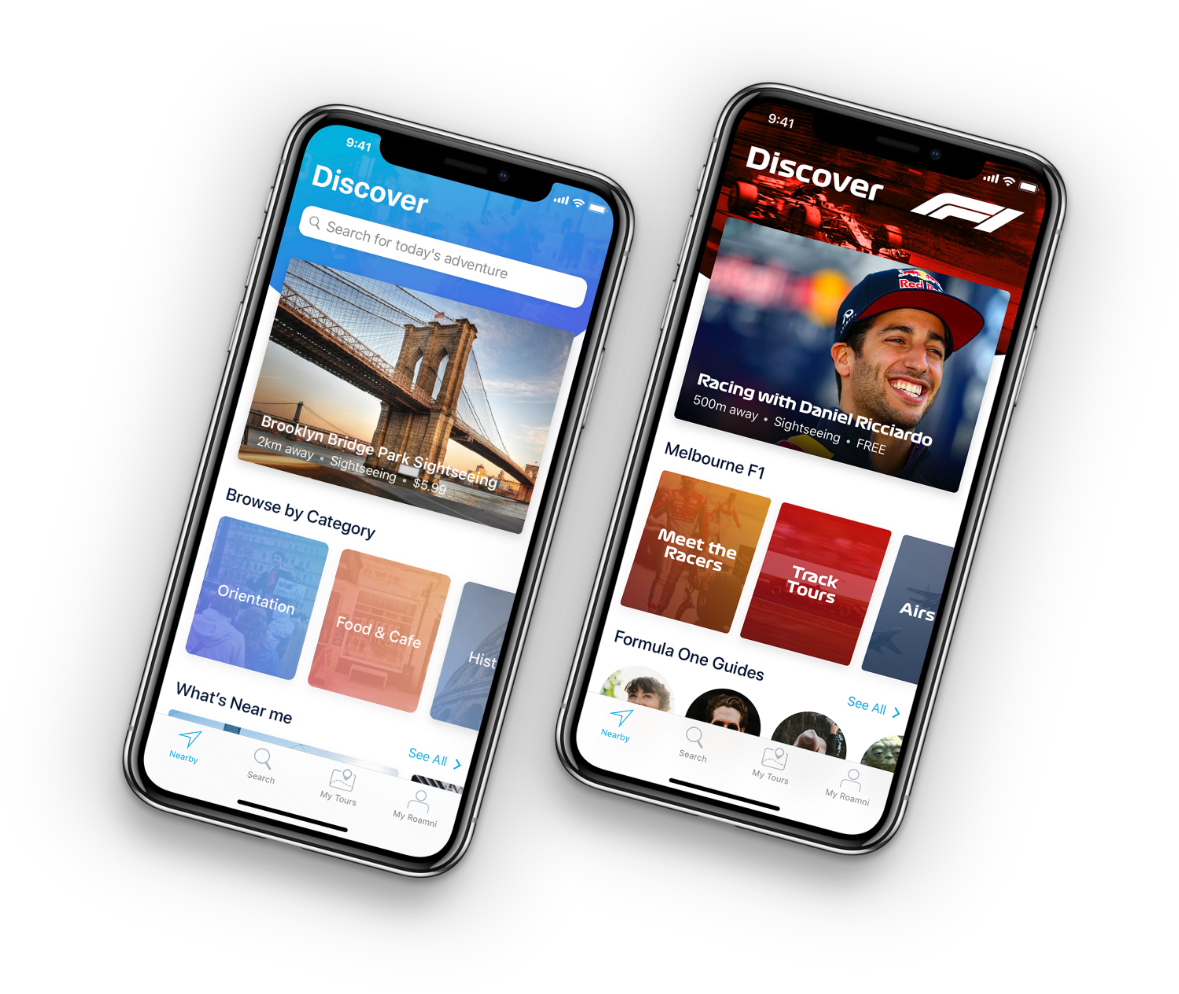35 Tech Startup Ideas That Sell in 2026

How powerful is an idea?
Well, it’s more potent than you might think.
From the rise of democracy to high-revenue products or services, almost all human achievements began life as a thought.
In the world of technology, Steve Jobs turned his idea of a user-friendly personal computer into Apple, a company worth around $3 trillion as of 2023. He did this despite having limited tech experience and scarce funding, at least in the beginning.
Like Jobs, you too can conceptualize and capitalize on your tech startup idea. All you need is the right information and insights.
Read this article to get inspiration and insights from the most groundbreaking tech startups. Ideas here can potentially generate massive income for you, improve your sales and customer service stats, or simply help you capitalize on your creativity.
To keep things simple, I have bundled the 35 profitable tech startup ideas in this article into main clusters so you can easily find the idea that best matches your needs or interests.
Here are the main clusters for this article (click any of the items below to immediately access that section):
TABLE OF CONTENTS
HEALTH AND ENVIRONMENT
EDUCATION AND CONSULTANCY
DESIGN
10. Gamified platforms for design education
SOFTWARE DEVELOPMENT
CUSTOMER SERVICE
16. Customer relationship management (CRM)
ECOMMERCE
21. Internet-based travel and tourism agencies
CONTENT CREATION AND OPTIMIZATION
23. Subscription-based fitness video platform
24. Search engine optimization (SEO)
SMART TECHNOLOGY
26. Robot-powered delivery services
MOBILITY SOLUTIONS
HARDWARE AND SOFTWARE MAINTENANCE
EXTENDED REALITY
BIG DATA AND AI
34. Artificial intelligence (AI)
FREQUENTLY ASKED QUESTIONS (FAQs)
1. What tech startup should I start?
2. How to come up with a tech startup idea?
3. Can you start a tech startup with no experience?
4. Can you sell a startup idea?
Discover the exciting possibilities awaiting you in the world of tech startups!
Health and environment
In its race to create the most innovative products and services, humanity tends to forget the basics. Without caring for human health and the environment, the tech startup space will not even exist at all.
Awareness of the immense importance of people and the planet has inspired many innovative businesses to invest in relevant sectors like biotech, food tech, and telehealth.
1. Biotech
Biology has gone from the lab to the marketplace.
Thanks to biotechnology, the study of living organisms has greatly improved human health and society through better products, processes, and methods. Despite the high capital requirements typically associated with the biotech industry, there is a consistent influx of new startups each year.
Interestingly, it is now possible to establish a biotech company with a relatively modest initial investment ranging from $0 to $200,000. Many biotech startups also gain recognition and support from angel investors and governments due to their potential to enhance human life sustainably.
Entrepreneurs, executives, and investors are also attracted to the sector because of the significant potential rewards associated with breakthrough discoveries. However, the challenges faced in this industry are not insignificant.
But with careful planning, innovative ideas, and meticulous execution, you can seize the tremendous opportunity the biotech sector presents. If you hit it big, you can enjoy a big slice of the industry, which could have a total global value of around $4 trillion by 2030.
2. Food tech
You can find one of the best tech startup ideas in the world of food tech, mainly because people need to eat before anything else.
But the modern-day food tech sector is unique because it considers both people and planet. In other words, food tech startups aim to make wholesome and healthy food for everyone without harming the environment.
The global food tech industry could be worth around $350 billion by 2026. With the right strategy and execution, a food tech startup could propel you to the head of the earnings table.
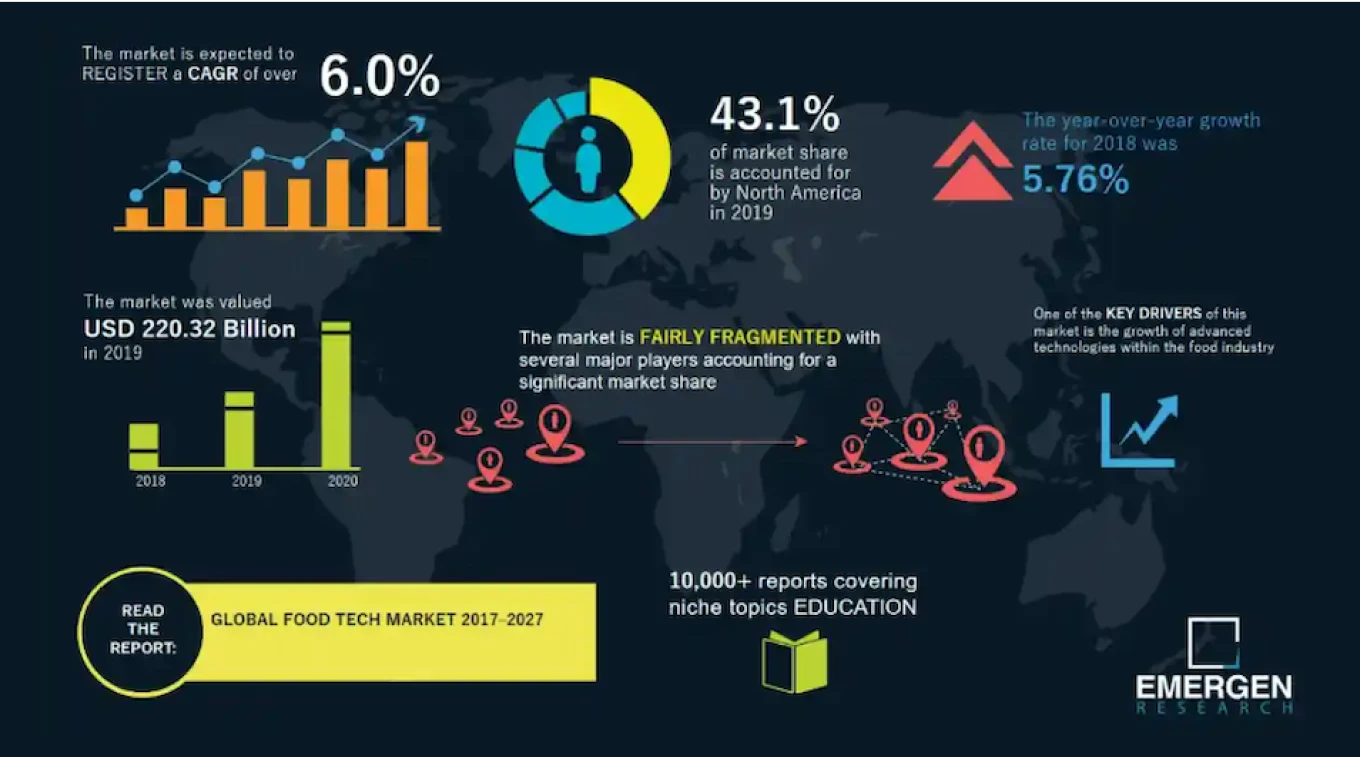
Source: Emergen Research
For example, companies like Beyond Meat and Bowery Farming have reaped success by providing healthy and environment-friendly diet alternatives to many consumers.
In Australia, Youfoodz has moved in the same direction. The food tech startup provides customers with healthy and delicious meals right at their doorsteps. To learn how Youfoodz has spread the culture of healthy eating while freeing people from the burden of cooking or doing groceries, check out the Youfoodz case study.
3. Telehealth
As COVID-19 brought death, it also gave birth to a new industry.
The contagious nature of COVID-19 inspired tech companies to develop platforms for doctors to serve patients far away through telehealth. With this technology, doctors can use video calls and other remote technologies to check on their patients without having to personally visit them.
Despite the waning of the pandemic, the telehealth industry is anticipated to grow to around $200 billion by 2025. So setting up a telehealth startup is a good idea even beyond the nightmare called COVID.
Both big shots and newcomers are getting into telehealth. For example, tech giants like Zoom and Cisco Systems have developed innovations in this space. Even our client BarbCare has left its mark on telehealth. With our help, this startup designed an app to help people monitor their loved ones in aged care facilities.
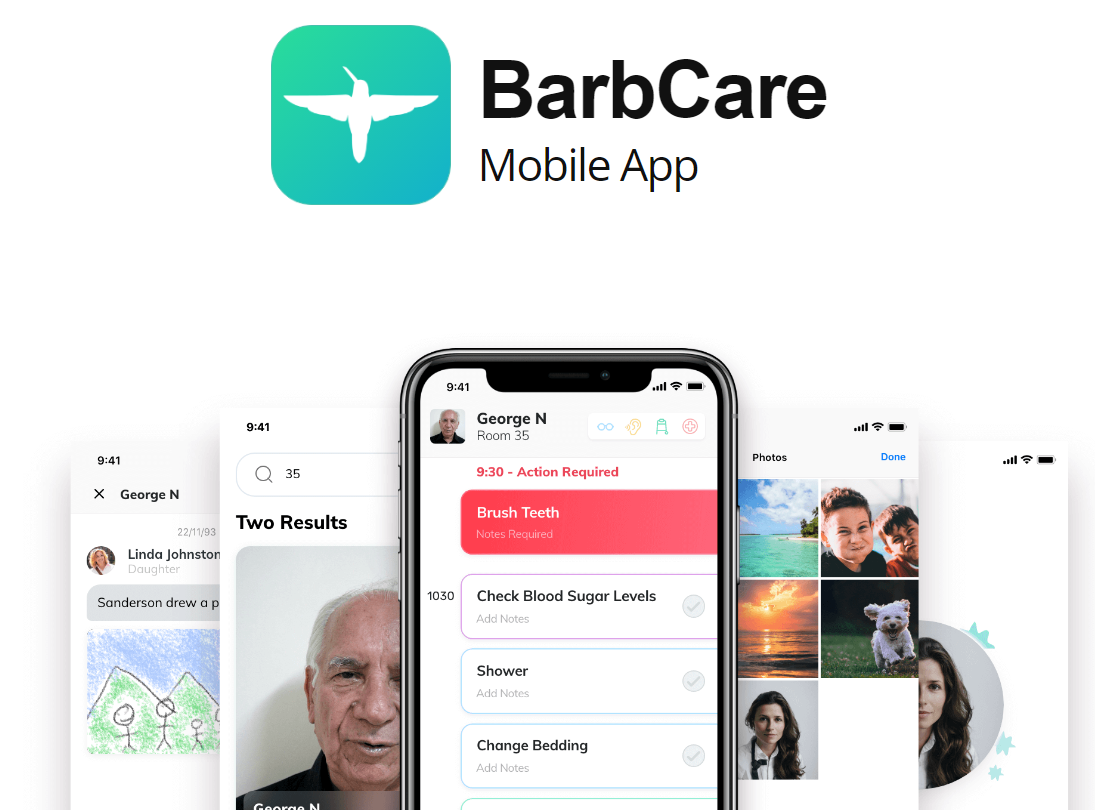
Education and consultancy
Given global society’s accelerated rate of change, information becomes irrelevant quite quickly these days.
That’s why tech business ideas that provide up-to-date education or expertise have become more crucial now than ever before. Specifically, many entrepreneurs and organizations have delved into edtech, ebook writing, tech consultancy, legal tech, and social media consultancy.
4. Edtech
As the 2020 pandemic raged on, students, teachers, and families moved from classrooms to cyberspace. This surge in online learning helped turn EdTech into a rapidly growing industry.
Despite the weakening of the COVID health crisis and the return to brick-and-mortar classrooms, the EdTech sector is still expected to grow mainly due to the following trends:
- Big companies are seeking to upgrade the knowledge and skills of their workforce
- Career shifters want to learn new skills without undergoing the usually lengthy college programs
5. Ebook writing

Source: Perfecto Capucine / Pexels
Ebook writing is another startup sector you might want to explore.
Since knowledge in many fields becomes obsolete relatively quickly, ebooks have become a more viable source of information for both learners and subject matter experts.
After all, the digital nature of ebooks makes them easier to create and distribute than printed books, and platforms like Flipsnack let publishers present them in a more interactive format that keeps readers engaged.
Some innovative ebook creators are even incorporating QR codes to link readers to supplementary online resources, enhancing the learning experience.
Writing and selling ebooks costs only a fraction of what you would spend if you published through traditional means. And if you don’t have a knack for writing despite your love for books, you can always hire freelance writers and subject matter experts.
6. Tech consultancy
Digital technology has increasingly become integrated with businesses in recent years.
In fact, Deloitte mentions that 69% of executives surveyed in 2021 admit that COVID accelerated their companies’ digitalization process. Beyond these statistics, the latest digital transformation trends have massively shifted how businesses use the Internet, hardware, and software to grow and scale.
Therefore, a tech consulting startup is a potentially profitable business you could consider.
7. Legal tech
The startup world is a global arena. Sometimes, a tech startup provides products or services for customers in different countries. It can be difficult to monitor the legal requirements and justice systems of different jurisdictions to avoid financially damaging liabilities.
Startups in this space leverage advanced technology to make legal consultations more efficient and less expensive to avail. For example, videoconferencing and generative AI services have streamlined law firm processes like providing legal advice, interpreting contracts, and converting contacts into clients.
If you set up a legal tech startup, your pursuit of fair play could pay dividends. This tech sector could grow to around $8 billion by 2029.
8. Social media consultancy
Big brands like PlayStation and KFC have used social media to drive business growth.
Combine this with the fact that social media trends change rapidly, and you have the ideal conditions for setting up a social media consultancy.
After all, social media marketing techniques that work one day may become obsolete a few weeks later. Establishing a startup in this sector can be potentially lucrative, given that many organizations don’t have enough time or expertise to create trendy social media campaigns.
If you love consuming social media content and envision creating your own, starting a social media consultancy offers a promising opportunity. Potential earnings in this space range from $15 to $20 per hour per client.
Design
If you’re into design or the visual arts, there are some ideas you can come up with to enable you to establish your own tech startup. You can delve into niches like UX services and the development of gamified platforms for design education.
9. UX services

Source: picjumbo.com / Pexels
A major factor in the success of many companies is the user experience (UX).
The main focus of a UX services startup is creating a pleasant, reliable, and seamless interaction between users and products. These positive UX characteristics are crucial to ensure that businesses will have a large and loyal customer base.
Aside from this, good UX helps organizations improve how they convert leads to customers or buyers. For example, well-designed websites can easily turn visitors into buyers or subscribers. To learn more about this and other conversion-related tips and tricks, check out our article on conversion rate optimization for mobile users.
If you’re into designing products like software, etc., to make them easy to use, this tech startup idea might be the perfect match for you. A UX designer in the U.S. earns around $100,000 annually, on average. Once you have a UX services startup, this is the ballpark figure of your potential income (or even more) if you have a good business model.
10. Gamified platforms for design education
Studies have shown that people, particularly introverts, learn better if gaming elements are incorporated into the educational process.
In the field of design, a gamified learning platform offers an innovative way to teach design principles in a fun and engaging way.
By incorporating gaming elements like interactive courses, challenges, points, and leaderboards, design education platforms improve learning outcomes. The primary market for this tech startup product includes aspiring designers, undergraduate students, and professionals who need knowledge of design to improve their organizations.
Monetization could follow a freemium model, with free basic courses and paid in-depth content. Revenue streams might include specialized courses, career coaching, and portfolio reviews. Subscription plans and microtransactions for exclusive content could further diversify income.
This platform meets the growing demand for 21st-century-ready design education and has the potential to attract a broad audience. Partnering with established designers would enhance credibility and content quality, supporting premium pricing. With the right execution, a startup could revolutionize design education and empower creative professionals.
Software development
Software is the set of instructions and other data types that allow people to perform tasks using computers and other similar devices.
Developing or building software is one of the most lucrative and useful industries out there. As you see below, many opportunities exist to establish a software development startup. Among the many products you can develop in this space include mobile apps, business software, video games, websites, and cloud technology.
11. Mobile apps

Software powers devices of all types, from cabinet-sized corporate mainframes to the ubiquitous laptop.
But perhaps one of the smallest devices containing software is the mobile phone.
The invention of the Internet-compatible smartphone made applications for mobile devices highly common. Mobile apps enable phone owners to play games, communicate, learn, etc.
It’s a good idea to invest in or think of concepts for apps designed for mobile devices. Worldwide revenue from app-based ads alone totals almost $600 billion. Aside from that, apps provide the opportunity to set up a business in a high-growth sector.
Do you have an original mobile app idea that you want to turn into a business? Contact our team of product strategists and learn about your chance of success.
12. Business software
Creating, sharing, and maintaining the software that businesses use daily forms the basis of this type of startup. With global revenue totaling around $500 billion in 2022, this industry offers tremendous growth potential.
And despite tight competition in this space, there is always room for the next big idea, should you consider a service like app development for startups. Just look at Perfect Circles.
Separate tools for invoicing, quote creation, and asset tracking have existed for years. However, Perfect Circles excels in combining them into a single, user-friendly platform for small and medium-sized businesses.
With the right tools and partners, you can also develop similar business software based on the needs of those around you. For starters, you can check out the Perfect Circles case study to get insights and inspiration for your next business solution.
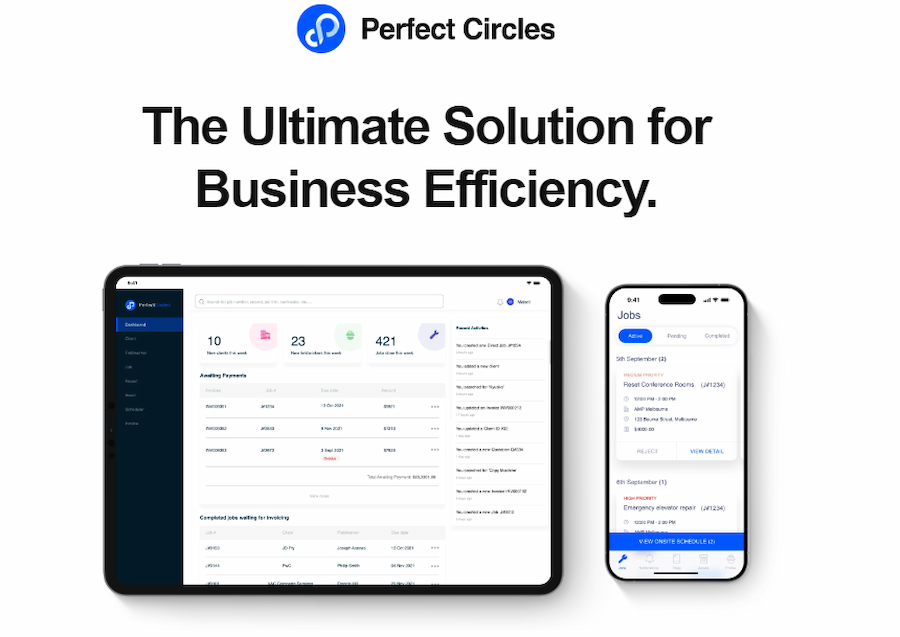
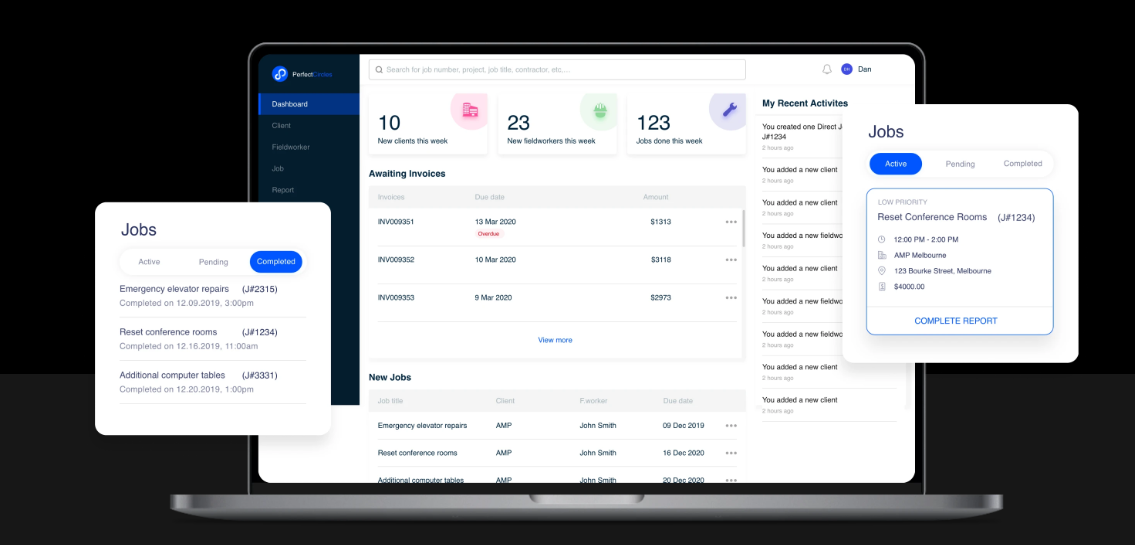
Source: Perfect Circles
13. Video games
Life is not just about meaning business every single time. Sometimes, people just want to have fun.
With around $200 billion spent on video games in 2023, it’s clear that many people love gaming. One of the easiest ways to innovate in this space is to create a game that combines popular gaming methods and content with a unique twist.
If you’re not skilled at game development, think about teaming up with experienced developers and visual artists who share your vision. But if you’re artistically inclined, the video below shows how to art direct a video game.
Source: Ask Gamedev on YouTube
14. Website development
Website development is essentially building the nuts and bolts that make up a website.
This kind of service is in demand these days. A new business needs a website in order to remain competitive. In fact, the percentage of businesses with websites jumped to around 70% in 2023. This increase is mainly due to the COVID-driven migration of many transactions online. Even post-pandemic, online financial services are expected to increase in momentum.
The trends and figures show that a web development company, which uses coding techniques to build the software that drives a website, is a good startup to consider setting up.
Website development should not be confused with web design, which focuses more on crafting visual layouts for site owners. If a website is a house, web developers are akin to civil engineers, while web designers are interior designers.
Whatever a website’s use case, form and function are necessary for success. For instance, let’s assume you are a business owner who needs a website. To expand your footprint in cyberspace, you need web design and development experts who can create websites that are as beautiful as they are capable of expanding your enterprise.
We’ve built such a website for PointsBet, a sports betting company that was able to expand from Australia to the United States. Check out our case study to discover how we helped grow PointsBet’s valuation from around $100 million to a little over $3 billion.


15. Cloud technology
The cloud technology industry could be worth almost $2 trillion by 2029. Cloud is a cost-effective technology that allows computer or smartphone users to accomplish tasks through Internet-based services instead of built-in hardware and software.
The power of the cloud has helped many businesses save on expenses while enabling them to effectively produce, serve, or build their reputation.
For example, a quick look at UC7 can show the wonderful possibilities of cloud technology. The digital system provides enterprise-grade solutions like business phones, collaborative tools, and CRM platforms at a fraction of the usual cost for such quality technology.

Customer service
Studies show existing customers tend to spend around 67% more than new ones.
This statistic highlights the financial benefit of keeping current customers happy. And effective customer service is crucial to attaining this objective.
For the said pragmatic reasons, many businesses are aiming to improve their customer service teams. So if you’re thinking of a tech startup idea, you can consider delving into sectors like customer relationship management (CRM), live chat services, and chatbots.
16. Customer relationship management (CRM)
Businesses also reach out to potential customers (leads) through customer relationship management platforms.
Tech entrepreneurs designing these platforms empower companies by allowing them to communicate with customers, conduct marketing campaigns, and analyze customer data all in one interface.
The industry is expected to be worth over $100 billion by 2026. That’s why you could make it big if you thought of a tech startup idea involving CRM.
The potential of a new tech startup idea to shake up the CRM world is not just pure buzz. If you want to see concrete examples, check out BuzzMe.
The startup founded by Susan Vincent wanted to improve the in-house experience of customers buying from establishments like small businesses, cafes, and restaurants. Through a web app that notifies customers when their order is ready, BuzzMe is living proof that even the simplest CRM idea can make waves.
To learn more about the inspiring story of Susan Vincent’s CRM startup, check out the BuzzMe case study.
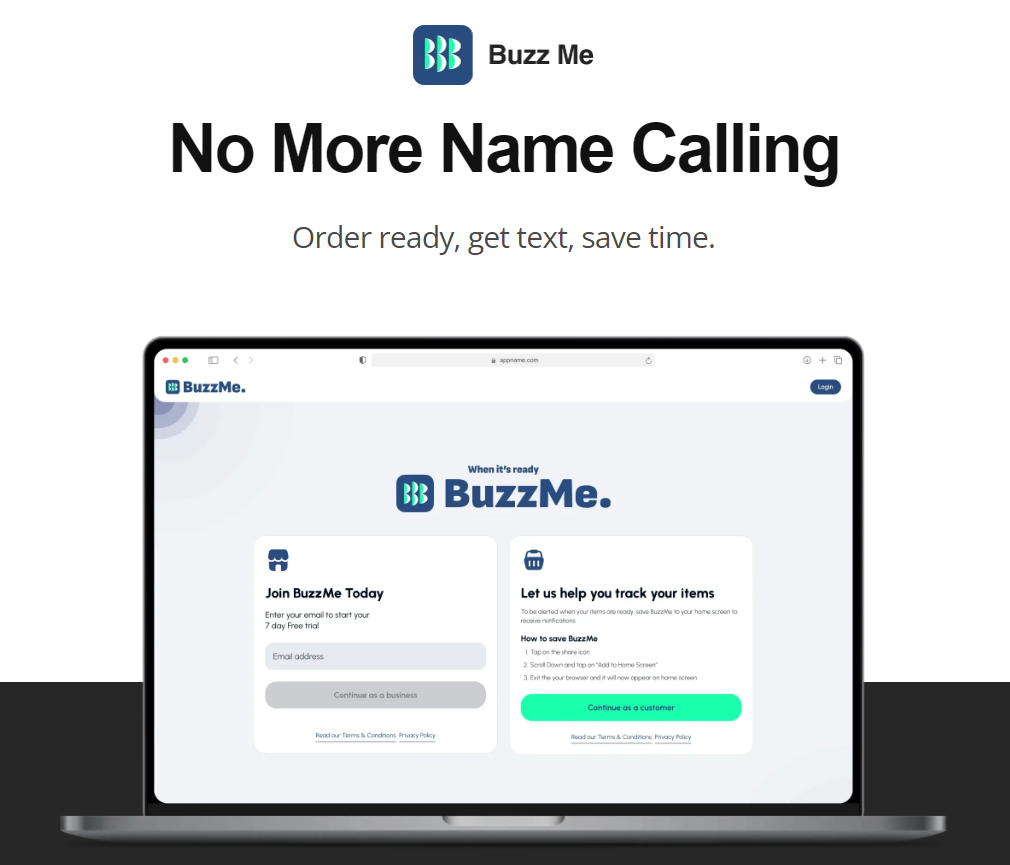
17. Live chat services
Another way to manage customer relationships is by using live chat services to respond to customer concerns.
In an era of instant gratification, instant responses from businesses are expected. Failing to promptly address customer issues could result in financial and reputational losses.
This is where live chat services become crucial. This type of startup is composed of customer service personnel who answer queries, complaints, and other concerns using chat software.
Given the simple nature of this model, a tech startup idea in this space has a healthy chance of blooming into a booming business.
18. Chatbots
Still along the lines of live chat, chatbots are essentially automated versions of live chat personnel.
More technically, they are computer programs that use artificial intelligence to respond to human questions effectively and credibly.
Chatbot development startups help businesses cut costs by making customer service teams leaner and more efficient. Specifically, chatbots help organizations make better use of their resources by answering basic questions about the business and guiding customers to the right products or services.
Ultimately, chatbots are the digital assistants and force multipliers of customer support staff. Given that enterprises and entrepreneurs will always need better ways to serve more and more customers, any idea related to the creation of more effective chatbots is likely to succeed.
E-commerce

E-commerce is the exchange of goods and services over the Internet. Whether you’re paying for an online course or buying shoes from a website, that’s e-commerce. Even the systems that enable the transfer of money and credit through Internet channels are part of this industry.
Several factors contribute to the promising nature of the e-commerce tech startup sector.
First, global e-commerce sales reached around $6 trillion in 2024, indicating a vast and growing market.
Additionally, the digital nature of ecommerce makes it relatively easier to set up than brick-and-mortar businesses. For one, you don’t have to deal with energy-sapping construction work and purchasing assets like furniture and storage facilities.
E-commerce businesses also benefit from scalability tactics as explored in the Attrock scaling ecommerce business guide, optimizing your website, and collaborating with influencers, among other approaches. This allows you to reach broader audiences across the globe at a fraction of the cost typical of traditional businesses.
It’s no surprise that many entrepreneurs and organizations are investing their time and energy in e-commerce sectors such as online marketplaces, fintech, and Internet-based travel and tourism agencies.
19. Online marketplaces
One e-commerce startup you can consider setting up is an online marketplace. Online marketplaces are essentially digital versions of markets, where multiple sellers trade with many buyers through the Internet.
Now, you might think it’s difficult to think of an original startup idea in the relatively saturated online marketplace sector. But the story of startup founder Sean Senvirtne may prompt you to think again.
When Sean started MyDeal in the 2010s, eBay and Amazon had been dominant for over a decade.
But Sean was not fazed. He found a market gap that has helped him carve his niche in the industry. He realized that many small and medium businesses in Australia had no idea how to sell their products online. Consequently, he came up with the MyDeal website to help connect these online sellers with buyers in cyberspace.
And from there, he went from strength to strength as he came up with another tech startup idea.
When he saw the rise in the use of smartphones, he approached us in 2020 so we could work with him in creating a marketplace app to augment his website. After launching his mobile app, MyDeal increased in value to $160 billion.
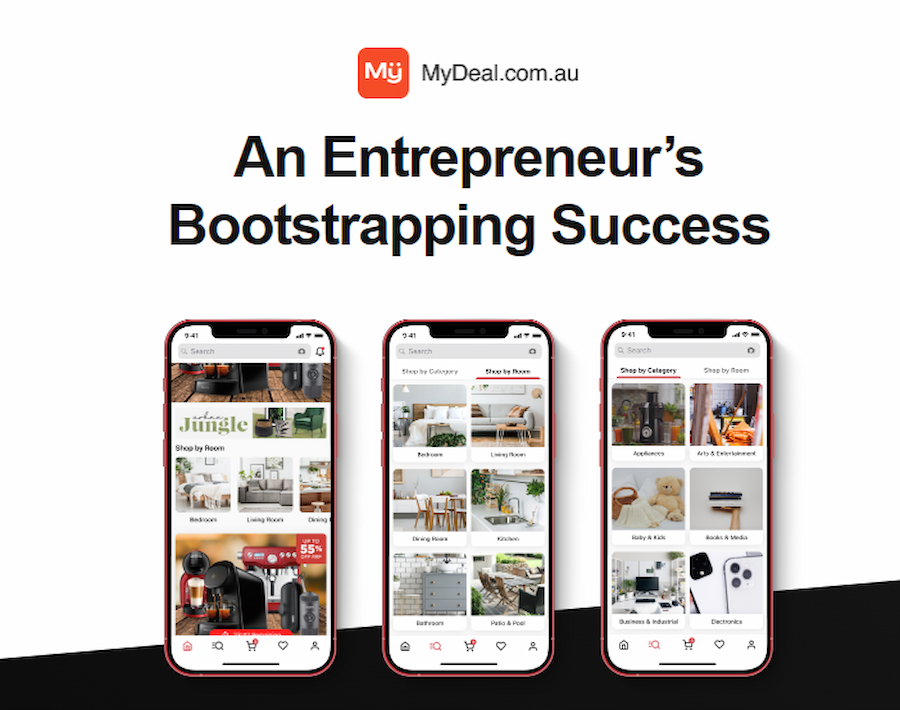
Sean’s success could also be yours.
Find that pain point that competitors aren’t addressing at the moment. For instance, you can start asking your neighbors or colleagues about what products they’re having difficulty buying online. With the help of the right partners, you can turn this basic market research into a tangible tech startup.
If you need help in this area, book a free consultation with us and discover how you can turn insights into a working marketplace app.
20. Fintech
E-commerce is not just the exchange of goods and services. It’s also making that exchange possible through a quick and seamless transfer of cash or credit between buyers and sellers.
This is where fintech comes into play.
An increasing number of people are enjoying the convenience of paying bills, buying products, investing, and doing other similar things with their money in the comfort of their own homes or offices. That is why the value of the fintech market is expected to grow to around $700 billion by 2030.
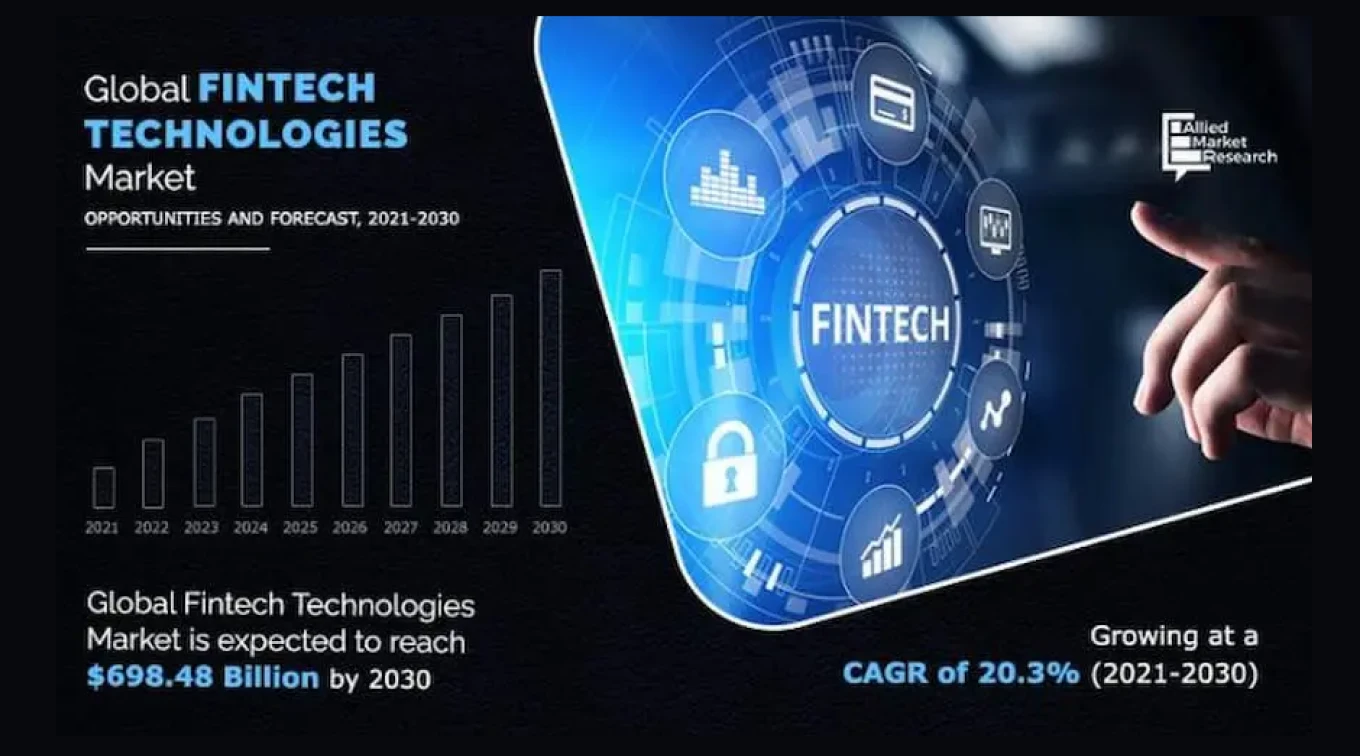
Source: Allied Market Research
21. Internet-based travel and tourism agencies
Establishing an online travel agency has become a popular trend. It’s all because Internet technology has enabled tour companies to save time and money when:
- Booking tickets
- Mapping travel routes
- Enhancing the overall travel experience
Aside from the said advantages, online travel agencies have become popular because they are potentially lucrative. In 2023, the online travel market was estimated to be worth around $520 billion.
But even without the financial figures above, a quick glance on the Internet or speaking to friends or colleagues would reveal that people just love to travel. So any tech startup idea that will help improve the way people explore various parts of the world can be a great source of business.
Lawyer Matthew Pacella was certainly aware of this potential when he conceptualized the travel app called Vaiva.

Through Vaiva, people no longer need to scramble through multiple travel documents and related files during their journey. The app enables users to integrate diverse itineraries, manage tickets, and even share travel photos all in one place. Check out the Vaiva case study to learn more about this innovative travel platform.
Content creation and optimization
Web content has come a long way from the simple text-and-images template of many 1990s websites.
Now, websites are filled with GIFs, videos, animations, and other forms of content. Aside from these, blogs and articles have increased in substance and beauty. The people behind these digital assets are called content creators. And there is great financial potential for startup entrepreneurs who dare to carve their place in this sector. In addition, a tool like a video generator has further enhanced the ability to produce captivating content efficiently.
And content won’t be complete without optimization, which is essentially about making content more visible to more people.
Some tech startup ideas you can consider in the online content and optimization space include podcasting, creating a subscription-based platform for fitness videos, and search engine optimization (SEO).
22. Podcasting
Radio is not dead.
It has just “migrated” online, thanks to podcasting technology.
Podcasts are essentially audio programs you can mostly access when connected to the Internet. However, there are podcasts that are downloadable.
You can financially gain from podcasts by hooking up with ad networks or soliciting donations from your listeners.
Just like in almost all media content, the body of content consumers make income possible. In America alone, there are around 140 million podcast listeners. That’s just a slice of the English-speaking world where you could base your podcast income.
And the more languages you speak, the better!
23. Subscription-based fitness video platform
The gym has moved to cyberspace.
A myriad of factors have led to this massive migration. From the COVID pandemic of 2020 to health insurance companies wanting to reduce costs, the socioeconomic landscape has shifted to convince more people to access a trainer or instructor via the Internet.
If physical fitness is your passion, this niche is definitely worth exploring. The online fitness market reached around $15 billion in value in 2022 and is expected to grow to around $251 billion by 2032.
One of the most energy- and cost-efficient ways to capitalize on this sector is to design and develop a subscription-based fitness video platform.
In this startup model, you don’t have to regularly pay for a group of trainers or break a sweat demonstrating a routine every time someone tries to access your platform. All you have to do is set up an app or website to store your recorded fitness videos, with users needing to pay a subscription fee to access the content.
Given that there are many app development agencies out there who can help you regardless of your tech background, setting up a platform to house fitness videos has never been easier.
For instance, startup founder Claudia Dean has no knowledge of coding. Yet, with the help of our team at Appetiser Apps, she created a unique fitness app.
The Royal Ballet Company graduate envisioned the Claudia Dean World app as a tool to help future dance superstars reach their potential. The mobile app has videos of personalized exercises to help enhance ballet technique and a rewards system to keep users motivated to stick to their routines. To learn more, check out the Claudia Dean World case study.

24. Search engine optimization (SEO)
Undiscovered treasure is pretty much worthless.
Likewise, high-quality content like blogs, podcasts, or videos is of little value if online users can’t discover it.
For this reason, many individuals and organizations with an online presence hire specialists in search engine optimization (SEO). These experts ensure that their clients’ content or web pages rank as high as possible on search engines like Google or Bing. The higher the search ranking, the greater the chance of attracting more potential customers or readers.
That’s probably why studies estimate that the SEO industry could be worth around $100 billion by 2025. If you’re into making content more discoverable and accessible to a larger number of people, then setting up an SEO agency is a good tech startup idea to consider.
Smart technology
Smart technology connects devices, appliances, and systems via the Internet, creating an ecosystem that enhances automation, efficiency, and user control.
Key components of this cutting-edge technology include connectivity through Wi-Fi or Bluetooth, sensors for data collection, automation, and remote control mechanisms.
Smart technology is increasingly shaping the outlines of the global society and economy. Therefore, it’s worth exploring its subsectors, particularly Internet of Things (IoT), robot-powered delivery services, and drone services.
25. Internet of Things (IoT)
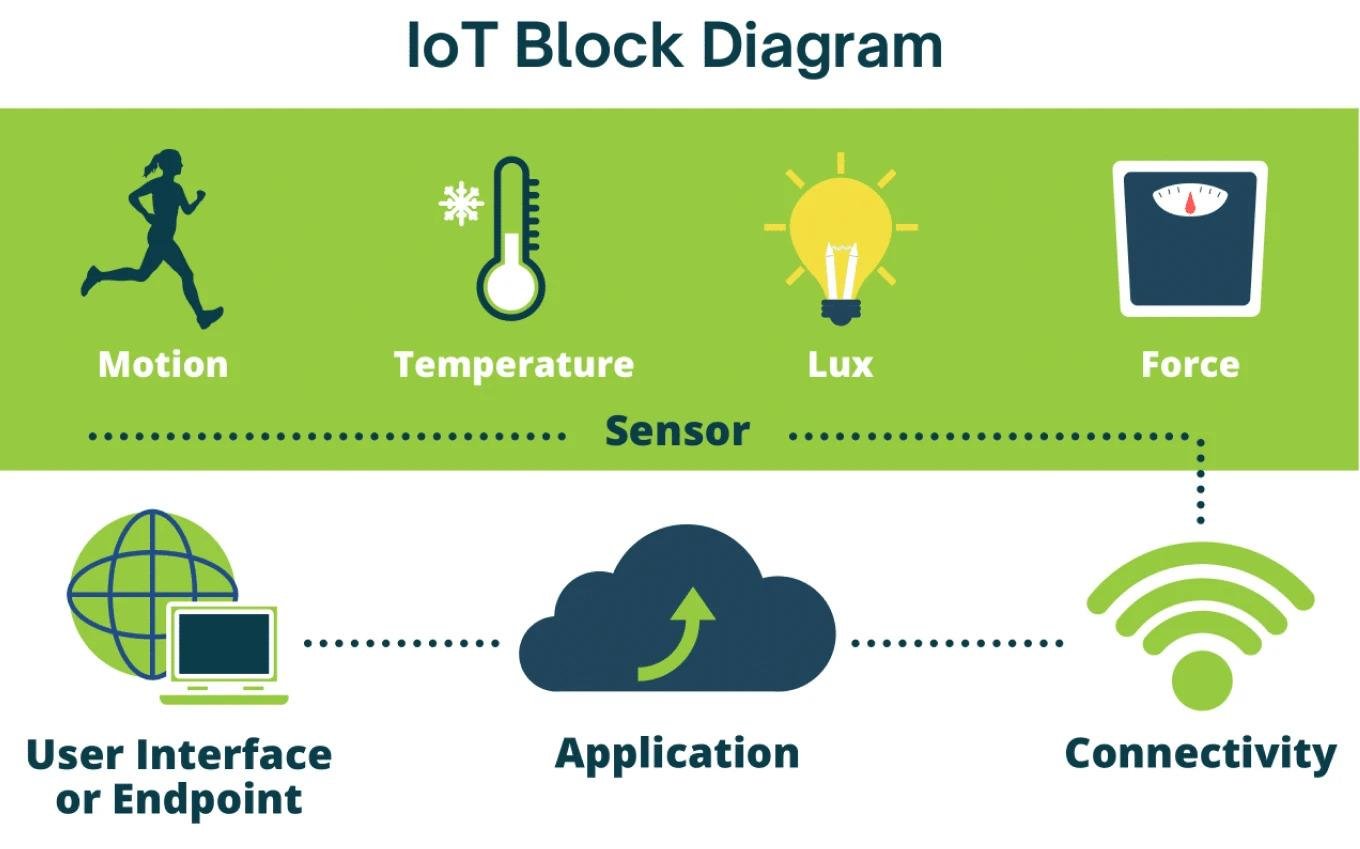
Source: Tacuna Systems
The Internet of Things encompasses a network of physical objects equipped with software, sensors, and similar technologies.
These technologies enable them to connect and share information with other systems and devices via the Internet. For instance, local camera and door lock systems use mobile phones to communicate with devices in your home, enhancing safety measures and preventing miscommunication.
Thinking of a tech startup idea for IoT is potentially lucrative, given that the industry was worth around $850 billion in 2023.
26. Robot-powered delivery services
Once considered the stuff of science fiction, delivering goods using robots is already a reality in some areas. Check out the video below to see these machines in action.
Source: Starship Technologies via YouTube
Statistics also indicate the rising tide of robot-powered delivery services. The industry was valued at around $240 million in 2022 and is expected to grow to around $2 billion by 2030. If you’re interested in this tech startup niche, consider these things.
27. Drone services

Source: Flo Dnd / Pexels
Like robots, drones have also heeded the call of people needing quick, quality, and cutting-edge services.
Technically speaking, drones are flying robots that can either be remotely controlled or navigate independently by following pre-programmed flight paths.
Tech startups and government agencies have integrated various systems on these flying platforms, ranging from weapons systems to high-tech cameras. These drones are so versatile and effective at what they do that brands like Walmart and FedEx have adopted them for delivery services.
Mobility solutions
Ever since humanity set foot on the planet, they have struggled to find better ways to transport themselves and their possessions.
In recent decades, a combination of global warming and an exponential increase in computing power has led to the shakeup of the transport sector. That is why mobility solution ideas like autonomous vehicles and conversions of gas-powered cars to electric vehicles (gas-to-EV conversions) are worth exploring.
28. Autonomous vehicles (AV)
Once exclusively found in science fiction works, self-driving cars are slowly but surely becoming a reality in our daily lives.
Though only around a handful of cities worldwide are testing or implementing autonomous transportation at the moment, the autonomous vehicle (AV) market is expected to generate $300 billion to $400 billion in revenue by 2035.
29. Gas-to-EV conversions
Converting gas-powered cars to electric vehicles (EVs) presents a lucrative tech startup opportunity due to growing environmental concerns and government regulations.
Millions of gas-powered cars on the road can be converted, offering a vast market potential. In fact, even a 1970s-era BMW can be converted to an electric vehicle (check out the video below). This sustainable approach aligns with environmental goals and can be more affordable than buying new EVs.
Source: CNBC on YouTube
Aside from love for the environment, governments have also been major factors in making gas-to-EV conversions more lucrative. For instance, California’s Climate Commitment and the European Union’s counterpart policy, Regulation 2023/851, make EV adoption more a necessity than an option.
If you’re thinking of a tech startup idea, a business centered on gas-to-EV conversion is potentially lucrative.
Hardware and software maintenance
As you probably already know, everything breaks. Whether due to human, electronic, mechanical, or environmental factors, devices and the software that run them need maintenance to serve their users well.
Venturing into tech repair services or cybersecurity can yield substantial financial rewards for your startup while ensuring individuals and organizations achieve peak performance through superior hardware and software maintenance.
30. Tech repair services
Unlike humans, hardware like drones, robots, and computers cannot “heal” themselves—at least not yet.
Until then, where advanced machines and devices work hard like humans, tech repair services are indispensable.
The demand for tech repair services is quite robust. Statistics show that the value of repaired electronic equipment worldwide amounted to around $122 billion in 2022. So this space is certainly worth considering if your thinking of a tech startup idea to build into a business.
31. Cybersecurity
Maintaining software functionality and integrity has been especially difficult as more devices become part of a network such as the Internet.
Many hackers use this global network of interconnected computers as a hunting ground to damage devices, disrupt software processes, and get unauthorized access to sensitive information. In the first half of 2022 alone, hackers launched around 3 billion malware and ransomware attacks.
Due to this massive threat, many entrepreneurs and organizations are increasing their spending on cybersecurity. This development suggests that a cybersecurity startup will not run out of clients anytime soon, so it’s definitely a sector worth considering.
Extended reality
Extended reality (XR) basically involves using hardware and software to blur the lines between the real and virtual worlds.
And believe it or not, this mind-boggling technology is not just for entertainment or gaming. Even businesses, blue-collar workers, and white-collar employees can stand to benefit from extended reality, as you will learn in the next section on the XR subsectors of virtual reality (VR) and augmented reality (AR).
32. Virtual reality (VR)
Virtual reality (VR) is a computer-generated, three-dimensional environment that users can engage and interact with in a manner that closely resembles their real-life experiences.
This highly immersive technology involves modified hardware such as headsets with monitors, body sensors, etc. These pieces of equipment give users the illusion that they can move in and act in a virtual world, with varying levels of immersion and realism.
Though VR has mostly been associated with bleeding-edge games, VR also has applications in the world of work, as you can see in the video below:
Source: Meta Quest via YouTube
Since VR has both business and entertainment value, it’s no surprise that establishing a technology startup in this space can be sustainably profitable. In fact, the VR industry is projected to experience significant market growth, expanding from $19.2 billion in 2022 to around $170 billion by 2030.
33. Augmented reality (AR)
Augmented reality (AR) is similar to VR but with a more balanced mix of reality and virtual worlds.
Unlike VR, where people are soaked in the virtual world of graphics and sounds, AR combines digital elements with the real world. Think Pokemon Go and Jurassic Park Alive. In these games, you can see virtual creatures running around in your area whenever you use your smartphone camera.
This seamless merging of the virtual and real is also used in businesses like home improvements. For example, furniture companies like IKEA use AR to show you how your purchase could look in your home or office. Check out the video below to see how this technology works.
Source: Marxent via YouTube
The AR industry is anticipated to generate almost $100 billion in gross revenue by 2026. Thus, augmented reality is an awesome field to consider when developing a startup idea.
Big data and AI
Thanks to artificial intelligence (AI), computers can now think and solve problems more or less like human beings. Though this technology has a long way to go to perfectly mimic humanity’s hallmark talent, AI platforms like ChatGPT and Gemini have come pretty close in recent years.
But if you take a closer look, AI is not really a magic wand. Neither is it an all-powerful entity. The truth is that the “intelligence” of any AI system is only as good as the data it’s fed.
In short, big data and AI are closely related to each other.
Combine these facts with the increasing influence of big data and AI on society, and you can glean one key insight: a tech startup in either field can yield massive revenue.
Let’s have a closer look at some tech startup ideas involving AI and data analytics:
34. Artificial intelligence (AI)
Artificially copying the human brain’s thinking power has gone from the lab to the market.
AI has been so effective that many companies have used an AI technique called natural language processing to analyze customer sentiments based on millions of comments and feedback. From this AI-driven analysis, businesses can improve their offerings or marketing strategy more quickly than if they relied purely on manual analysis of customer data.
This and other use cases have been instrumental in producing $90 billion worth of value in the AI industry in 2021. Beyond that, the sector is expected to grow by 38.1% annually until 2030.
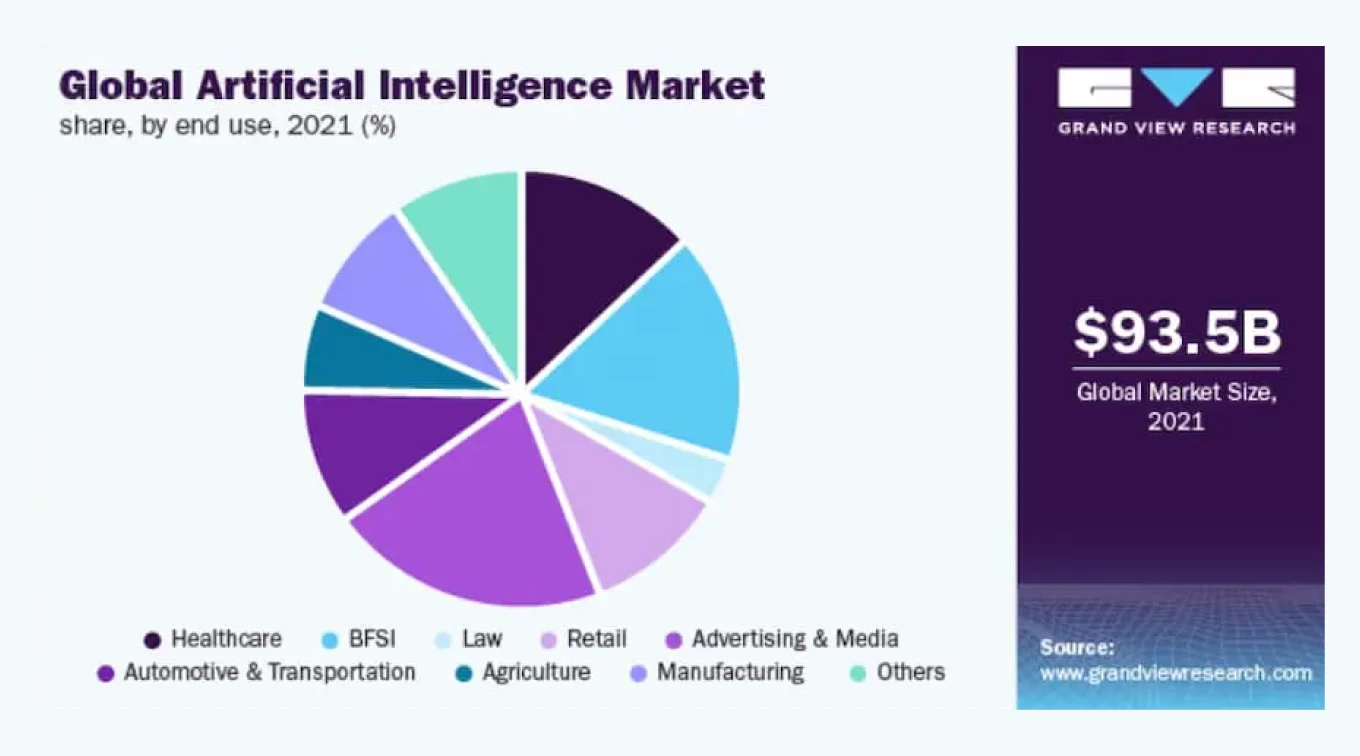
Source: Grand View Research
35. Data analytics
I mentioned earlier the close connection between data and AI.
Interestingly, though AI can’t “survive” without data, data doesn’t need AI to thrive.
In fact, data analytics existed around 200 years before the invention of the first AI-powered computer.
Data analytics is about extracting insights from a large and confusing haystack of numbers, text, and other information.
Since the technology for quickly gathering and processing extremely large volumes of data became available, big corporations have leveraged data analytics to assess and improve their current performance, as well as predict the likelihood of future success.
Studies also indicate that, given the right conditions, small and medium-sized enterprises (SMEs) can leverage data analytics for competitive advantage.
It’s clear that data analytics is gaining momentum in the world of business. So if you’re thinking of what tech startup idea you should capitalize on, this space shows a lot of promise.
Success starts with inspiration
Regardless of your definition of success, you will only get far if you’re inspired by something.
Whether you’re an inventor or a dreamer, your tech startup ideas could only bear fruit if you were immersed in the fertile ground of inspiration, the right education, and talented people.
We hope this article covered the inspiration bit. To learn more from seasoned yet friendly tech startup experts, all it takes is one simple act.
Reach out to us so we can discuss how to turn your vision into the next best tech startup.
Frequently asked questions (FAQ)
What tech startup should I start?
The tech startup you should start is something you’re either good at or highly passionate about.
For instance, if you love processing numbers and information and getting insights out of them, you should establish a startup related to data analytics.
If you are not so good at analytics yet are passionate about helping people through that field, there are many non-college learning organizations and product development companies that can help address your gaps in technical or business knowledge.
Whatever tech startup you establish based on skill or passion, you also have to consider whether there is an actual market need for your startup’s products or services. Otherwise, your chance of long-term success may diminish.
How to come up with a tech startup idea?
To come up with a tech startup idea, you basically need the following ingredients: passion for solving a problem that many people are willing to pay for, information from industry competitors, and awareness of the latest socio-economic megatrends.
Once these ingredients are all aligned, there’s a high probability you’ll come up with a tech startup idea that generates revenue or grows your organization successfully for the long haul.
Can you start a tech startup with no experience?
Yes, you can. Tech experience isn’t that essential to launch a successful tech startup.
What’s important is your focus on identifying a real problem in the market that tech can solve and build a team that can fill any expertise you lack.
However, establishing a tech startup requires strong leadership, business planning, and marketing skills. If you lack any skill in any of these departments, platforms exist to help you find online course materials, technical cofounders, freelancers, or app development agencies to help you get started.
As long as you have a clear vision and partner with the right people, you can turn your idea into a tech startup.
Can you sell a startup idea?
Yes, you can. It’s worth noting, though, that it can be difficult to sell a startup idea as it is without any legal safeguards. To make sure you get the best out of selling your idea, implement it in some shape or form first, license it, or get a provisional patent for your startup concept.
One of the best way to implement your startup idea is by creating a prototype based on it. Tech startup Roamni did something along these lines to succeed. Though the tour tech company didn’t actually sell its idea, the prototype they developed enabled them to acquire around $3 million in funding.

Licensing is another alternative to selling your app idea. This is like renting out your app idea instead of selling it outright, which is ideal if you prefer recurring income over a one-time windfall. Big companies like Henkel and Nokia are willing to pay for your startup idea through a licensing arrangement.
Whatever way you wish to sell your startup idea, I highly recommend you get a provisional patent for it to add that extra layer of legal protection without the high cost of a full-fledged patent. Consult lawyers in your country or the jurisdiction where your tech startup will operate to see if provisional patents are available there.
People also ask
What’s the best tech startup idea for 2026?
There’s no one-size-fits-all answer. The best idea is a sweet spot among your skills, your interests, and a real market problem. Turns out, Steve Jobs didn’t start by chasing trends. He chased a belief in simplicity. The trick is choosing a domain you can obsess over, with customers who genuinely need what you’ll build.
How do I discover a viable tech startup idea I can actually build?
Start by identifying pain points, anywhere you or others say, “I wish this were easier.” Combine that with trend watching (AI, IoT, healthtech, etc.), competitor research, and a dose of imagination. Test early. Prototype. Iterate. Don’t fall in love with your first idea. Fall in love with solving a problem well.
Can someone with zero technical experience launch a tech startup?
Yes, but you’ll need helpers. You’ll need to build a team (co-founder, freelancers, or agencies) to fill the gaps. Your job? Be the glue, the storyteller, the connector. The vision, the understanding of customer pain, the drive. Many founders begin as domain experts (health, education, finance) and bring in coders later.
How do you validate a tech startup idea before spending money or time?
Look for proof before you build. Start with a simple landing page or minimal prototype and offer pre-orders or a “join the waitlist” option. Talk to potential users to understand their problems, and run small ads to test interest. If people actually sign up—or even pay a little—that’s proof more convincing than any pitch deck.
Is it possible to sell a tech startup idea without building anything?
In theory, yes. But in practice, it’s hard. Ideas are cheap; execution is expensive. If you want to sell the idea, build a prototype, get proof (users, engagement), or secure IP (e.g. patents or licensing). That way, you’re not selling “just a dream.” Buyers care about risk, not possibilities.
How many tech startup ideas should I explore before choosing one?
Think of ideas like options. The more you explore, the more likely you’ll land on a winner. But don’t spread yourself too thin. Test 3 to 5 ideas superficially (user interviews, rough prototypes). Then, double down on the one that shows traction, feasibility, and your passion.
Which industries offer the most opportunity for tech startups right now?
I’d say look where society is pushing. Right now, sectors like AI & data analytics, fintech, healthtech / telehealth, IoT / smart tech, and cybersecurity are thick with opportunity, especially if you can do something new, faster, or cheaper.

Jesus Carmelo Arguelles, aka Mel, is a Content Marketing Specialist by profession. Though he holds a bachelor’s degree in business administration, he also took courses in fields like computer troubleshooting and data analytics. He also has a wealth of experience in content writing, marketing, education, and customer support.


